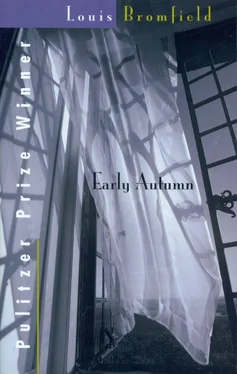But she knew, too, that he had gone away to fight, freed now and moved only by his passion for success, for victory.
And before she could answer Higgins, who stood there wanting her to send him to Michael, Miss Egan appeared, starched and rigid and wearing the professional expression of solemnity which she adopted in the presence of bereaved families. She said, “It’s about her, Mrs. Pentland. She seems very bright this morning and quite in her right mind. She wants to know why he hasn’t been to see her for two whole days. I thought. …”
Olivia interrupted her quietly. “It’s all right,” she said. “I’ll go and tell her. I’ll explain. It’s better for me to do it.”
She went away into the house, knowing bitterly that she left Miss Egan and Higgins thinking of her with pity.
As she climbed the worn stair carpet to the north wing, she knew suddenly a profound sense of peace such as she had not known for years. It was over and done now, and life would go on the same as it had always done, filled with trickiness and boredom and deceits, but pleasant, too, in spite of everything, perhaps because, as John Pentland had said,”’One had sometimes to pretend.” And, after all, Sybil had escaped and was happy.
She knew now that she herself would never escape; she had been too long a part of Pentlands, and she knew that what the old man had said was the truth. She had acted thus not because of duty, or promises, or nobility, or pride, or even out of virtue. … Perhaps it was even because she was not strong enough to do otherwise. But she knew that she had acted thus because, as he said, “There are things, Olivia, which people like us can’t do.”
And as she moved along the narrow hall, she saw from one of the deep-set windows the figure of Sabine moving along the lane in a faint cloud of dust, and nearer at hand, at the entrance of the elm-bordered drive, Aunt Cassie in deep black, coming along briskly in a cloud of crape. No, nothing had changed. It would go on and on. …
The door opened and the sickly odor of medicines flooded the hallway. Out of the darkness came the sound of a feeble, reed-like voice, terrible in its sanity, saying, “Oh, it’s you, Olivia. I knew you’d come. I’ve been waiting for you …”
THE END
Cold Spring Harbor, Long Island
June 4, 1925
St. Jean-de-Luz, B. P., France
July 21, 1926

With an exceptional gift, Louis Bromfield directed his excessive energy toward writing, talking, farming, and the business of making sense out of his surroundings—culminating in the creation of a socially exciting and ecologically significant homestead in Pleasant Valley, Ohio, known as Malabar Farm. Louis Bromfield: 1896–1956; Pulitzer Prize 1927.
Other books by Louis Bromfield
The Green Bay Tree
Early Autumn
The Strange Case of Miss Annie Spragg
The Farm
The Man Who Had Everything
The Rains Came
Mrs. Parkington
Awake and Rehearse: Selected Stories
Pleasant Valley
Malabar Farm
Out of the Earth
From My Experience
Animals and Other People













